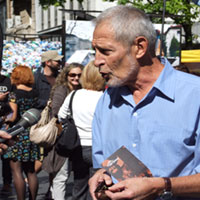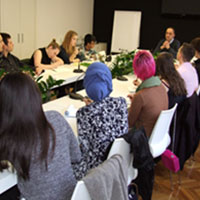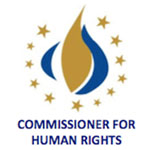


 On Saturday, March 4th, 2017, the Humanitarian Law Center (HLC) was left without its long-lasting associate and friend, Film Director Lazar Stojanović.
On Saturday, March 4th, 2017, the Humanitarian Law Center (HLC) was left without its long-lasting associate and friend, Film Director Lazar Stojanović.
Lazar’s contribution to the HLC’s mission was immeasurable. During all these past years, he selflessly put his many proficiencies at the service of establishing the truth about the crimes committed during the wars in the former Yugoslavia and achieving justice for victims. As the author of „The Scorpions- A Home Movie “, he helped inform the public about the participation of the notorious unit in the war in BiH and its involvement in the commission of the Srebrenica genocide. He invested his inexhaustible energy unstintingly in the Initiative for the establishment of RECOM, by leading the media campaign which followed the collection of support signatures for establishing this body, and by demanding that government representatives be dedicated to the building of a regional peace.

 Students from the School for International Training – (SIT) visited the Humanitarian Law Center (HLC) on Thursday, March 2nd 2017. These students go to various universities in the United States, and they are staying in Serbia, Bosnia and Herzegovina and in Kosovo as part of the Peace Studies, the programme organized by the Center for Comparative Conflict Studies at the Faculty for Media and Communication.
Students from the School for International Training – (SIT) visited the Humanitarian Law Center (HLC) on Thursday, March 2nd 2017. These students go to various universities in the United States, and they are staying in Serbia, Bosnia and Herzegovina and in Kosovo as part of the Peace Studies, the programme organized by the Center for Comparative Conflict Studies at the Faculty for Media and Communication.

 On February 27th, 2017, it will be 24 years since the crime in Štrpci (BiH), in which members of the Republic of Srpska Army (VRS) kidnapped and killed 20 passengers on a train travelling from Belgrade to Bar, among whom were 18 Bosniaks, one Croat and one foreign citizen of African or Arab origin, whose identity has not been established. The Humanitarian Law Center (HLC), Women in Black, the Youth Initiative for Human Rights (YIHR) and the Sandžak Committee for the Protection of Human Rights and Freedoms would like to remind the public of the responsibility which lies on the institutions of the Republic of Serbia for this crime, as well as of the fact that the victims’ families are still waiting for justice from the courts in Serbia and for the recognition of their status as family members of civilian victims of war.
On February 27th, 2017, it will be 24 years since the crime in Štrpci (BiH), in which members of the Republic of Srpska Army (VRS) kidnapped and killed 20 passengers on a train travelling from Belgrade to Bar, among whom were 18 Bosniaks, one Croat and one foreign citizen of African or Arab origin, whose identity has not been established. The Humanitarian Law Center (HLC), Women in Black, the Youth Initiative for Human Rights (YIHR) and the Sandžak Committee for the Protection of Human Rights and Freedoms would like to remind the public of the responsibility which lies on the institutions of the Republic of Serbia for this crime, as well as of the fact that the victims’ families are still waiting for justice from the courts in Serbia and for the recognition of their status as family members of civilian victims of war.
The victims of this crime were: Esad Kapetanović, Ilijaz Ličin, Fehim Bakija, Šećo Softić, Rifat Husović, Halil Zupčević, Senad Đečević, Jusuf Rastoder, Ismet Babačić, Tomo Buzov, Adem Alomerović, Muhedin Hanić, Safet Preljević, Džafer Topuzović, Rasim Ćorić, Fikret Memović, Fevzija Zeković, Nijazim Kajević, Zvjezdan Zuličić and one unidentified person.

 The Council of Europe Commissioner for Human Rights announced on February 22nd, 2017 a report titled “Missing Persons and Victims of Enforced Disappearance in Europe”, which summarizes the findings and recommendations for improving the search for missing persons and the protection of rights of victims of enforced disappearances in the member states of the Council of Europe (CoE). The report ensued after a roundtable with human rights defenders held in mid-2016 in Strasbourg and attended by the representatives of the CoE, the UN Special Rapporteur on Human Rights Defenders, a member of the UN Working Group on Enforced or Involuntary Disappearances and human rights defenders from the member states of the CoE, including the Humanitarian Law Center. The aim of the meeting was to exchange information on the situation in European countries affected by the problem of missing persons, based on the findings and recommendations of the Commissioner in March 2016.
The Council of Europe Commissioner for Human Rights announced on February 22nd, 2017 a report titled “Missing Persons and Victims of Enforced Disappearance in Europe”, which summarizes the findings and recommendations for improving the search for missing persons and the protection of rights of victims of enforced disappearances in the member states of the Council of Europe (CoE). The report ensued after a roundtable with human rights defenders held in mid-2016 in Strasbourg and attended by the representatives of the CoE, the UN Special Rapporteur on Human Rights Defenders, a member of the UN Working Group on Enforced or Involuntary Disappearances and human rights defenders from the member states of the CoE, including the Humanitarian Law Center. The aim of the meeting was to exchange information on the situation in European countries affected by the problem of missing persons, based on the findings and recommendations of the Commissioner in March 2016.